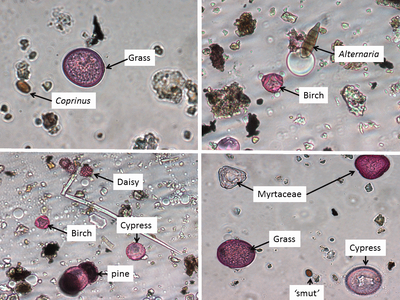Why is there pollen in Melbourne's air?
Plants are immobile and so cannot go searching for suitable mates the way animals do. To ensure their gametes reach a receptive mate, plants have developed many ways of distributing their pollen.
Some species use the wind to carry pollen between plants. These plants have very simple, dry flowers that do not secrete the nectar that attracts birds and insects. Wind-borne pollen can drift considerable distances. Pine pollen, for instance, can be carried hundreds of kilometres. But, then pine pollen has wings that serve as floats!
Pollen of wind-dispersed species such as rye grass, the major source of allergic pollen in Melbourne's air, is relatively small in size, has a smooth outer surface, and is quite dry and powdery.
Plants that use insects and birds to carry pollen between individuals produce pollen that is larger and has extensive surface ornamentation or a sticky surface so that the pollen grains get snagged by hairs and feathers. These pollen grains are also heavier than wind-borne pollen and have less chance of drifting any distance on the wind.



